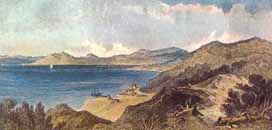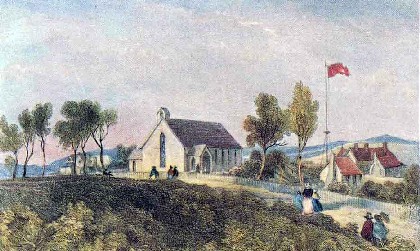 | Twelve months in Wellington / by John Wood (1843)
Chapter 7 |
| Contents: preface | introduction | narrative | chapters: 1 | 2 | 3 | 4 | 5 | 6 | 7 | 8 | 9 | 10 | 11 | 12 | |
Much has been written on the superior tone of society is Wellington. The Company invariably conclude their auctioneer-like addresses to the British public by proclaiming New Zealand free from the curse of a penal settlement. Their correspondence with Her Majesty's Government betrays an angry jealousy on this head, which, if called for, amounts to virtuous indignation. But no cause exists for this parade of philanthropy. The community at Wellington had not, up to the time I left the islands, been troubled with convicts from New South Wales, - the penal laws and regulations of that colony being so stringent as to render a felon's escape a rare rather than a common occurrence. This allusion, however, to a convict population answered the purposes of the Company. It injured the elder Australian colonies in the eyes of the emigrant, while it impressed him with the superior morality and consequent advantages of their settlements in Cook's Straits. Is this the case? Let us see.
During our residence we enjoyed the services of two ministers of the gospel, - the Rev. John McFarlane, of the Scotch kirk, and Mr. Aldred, of the Wesleyan communion. The latter gentleman, a missionary to the aborigines, could not give that attention to his European brethren which otherwise he joyfully would have done. Mr. McFarlane preached twice every Sunday, and, when his strength permitted, a Gaelic sermon in the interim to the Highland emigrants. But the attendance was usually thin. The Exchange, a wooden building, rented for the performance of public worship, was seldom well filled. In July Mr. McFarlane observed, that on two preceding Sundays his audience had dwindled to seven and fourteen individuals. Week after week did the minister urge the better observance of the Lord's day; and often while speaking was the truth of his remarks verified, the attention of the congregation being disturbed by the sharp crack of a fowling-piece, or by the clatter of horses hoofs, as those who should have known better galloped past the door. Every Sunday morning, if the weather was fine, sporting parties might be seen on their march for the woods, bent on a day's diversion, and returning towards sunset with a few parrots or pigeons, the only game a New Zealand forest supplies. (footnote 1) In the town we have witnessed, not once, but often, the mechanic and labourer working as on a week day. The inclement weather of Port Nicholson, its almost incessant wind and rain, compels the emigrant to provide a water-tight covering to shelter his family when he quits the Company's barracks, which he is compelled to do three weeks after his arrival. His case is, indeed, urgent; and the poor man may be forced to profane the sabbath as above described, though very much against his inclination. But with those who are more comfortably circumstanced, and who, from their situation, might be expected to set an example to others, no such palliation can be offered for their constant breach of the fourth commandment. There are, doubtless, many good people in Wellington; but we can truly assert that, if an observance of the sabbath and attendance on Divine worship be favourable tokens, society in the much-execrated penal colonies is better than at Port Nicholson. A mechanics institute has been formed by the working men, aided by a few of their friends. A circulating library, which the class above them lacked energy to manage, has been made over to the institution. Here the elementary branches of education are taught; and up to the period of our quitting Wellington it was the only public school in the settlement. Dr. Knox and Mr. Woodward are two gentlemen who deserve well of the community. The former is indefatigable in his endeavours to diffuse the blessings of education ; while the latter is equally zealous in the cause of temperance. On the occasion of the bishop of New Zealand's visit to Wellington, the Gazette expressed regret that Dr. Selwyn should have omitted to visit their literary establishments. The settlers were ignorant until then of possessing them ; but this is of a piece with the effrontery with which the hirelings of this Company put forward statements to entrap the unwary. Unlike the common herd, they do not rest contented with the usual appeal to the avarice of mankind; but taking higher ground, as a surer means of enticing a different class of emigrants, they exclaim, "The scientific and the literary will find those delightful institutions of the mother country already grafted and flourishing in the land of their adoption." But this was carrying the joke too far, and gave rise to the subjoined notice in the Colonist
"Sir, - In the Gazette of last Saturday I observe a paragraph in which it is stated that Dr. Selwyn (meaning, I presume, the Lord Bishop) declined visiting any of our 'literary establishments.' Although not a very literary character myself, I feel curious to ascertain where those establishments are situate, their nature, &c., and any other information regarding them it may be in your power to afford. By stating these particulars in your journal you will confer an obligation upon the inhabitants of Port Nicholson generally and individually on your obedient servant,The statistics of crime we have not the means of recording but the Colonist of 5th August, 1842, contains a letter from which the following is an extract : "Sir, - When I was a boy, my father told me that an essential part of my education would be to gain a knowledge of the general laws of the land in which my lines might be laid; my experience in these colonies, however, shows me that this knowledge is in nowise sufficient for my personal safety, nor the security of my property, and especially in Port Nicholson."Here follows an account of some trials and convictions "Before these convictions and sentences, crime did not abound so much in this place as it now does ; even more than it does in the penal colonies."Again, on the 16th of August, we find his Honour B. S. Halswell, Esq., Judge of the County Court, acknowledging to the jury the grave nature of the offences in the calendar, and confessing crime to be on the increase.
Footnote
|

